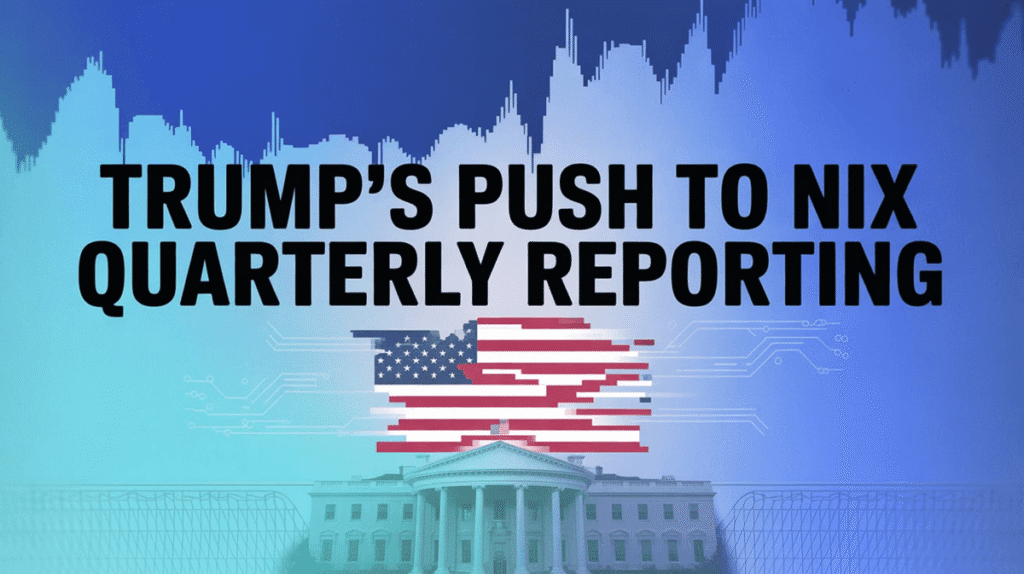Trump’s Push to Nix Quarterly Reporting Gains Momentum
Key Takeaway: Trump’s renewed push to end quarterly reporting could succeed this time as regulators and businesses embrace long-term strategies.
A Revival of a Controversial Idea
Former U.S. President Donald Trump is again pushing to abolish mandatory quarterly earnings reports for publicly traded companies. Once considered too radical, the proposal is now being taken more seriously in Washington and on Wall Street.
The argument is simple: Quarterly reports encourage companies to focus too much on short-term profits at the expense of long-term growth. Supporters of Trump’s plan believe that reducing reporting frequency will cut compliance costs, free management from constant market scrutiny, and help businesses focus on strategy rather than stock market expectations. A senior official told Reuters, “There’s a strong belief that quarterly reporting has become a distraction from building long-term value.”

Why the Timing Favors Change
This is not Trump’s first attempt to tackle corporate reporting rules. In 2018, he asked the Securities and Exchange Commission (SEC) to review the feasibility of switching to biannual reporting. At the time, the initiative fizzled, as regulators and investor groups feared reduced transparency.
But conditions have shifted in 2025. According to Yahoo Finance, regulatory leaders now appear more open to the idea, citing the need to modernize outdated requirements. Global precedents also strengthen the case: Europe and the United Kingdom have already relaxed quarterly reporting, giving American policymakers a model to follow.
Analysts argue that the political climate is more favorable as well. Trump’s allies in key regulatory positions are prepared to move quickly, while corporate executives and investors concerned with sustainability are less resistant than in years past.
The Debate Over Transparency
Critics of quarterly reporting argue that it fosters a culture of “earnings obsession,” where companies focus narrowly on beating Wall Street forecasts every three months. This short-termism, they say, discourages investment in research, innovation, and sustainability initiatives.
Supporters of Trump’s push often cite the views of Warren Buffett and JPMorgan CEO Jamie Dimon, who in 2018 called for ending quarterly earnings guidance. Both argued that frequent reporting distorts corporate priorities and undermines long-term shareholder value.
However, investor protection groups remain cautious. They argue that less frequent reporting could reduce transparency, leaving retail investors with fewer tools to track performance. While large institutional investors may have access to additional data and direct company engagement, smaller investors rely heavily on quarterly filings to make informed decisions.
Historical Roots of Quarterly Reporting
Quarterly reporting has been a cornerstone of U.S. capital markets since the 1930s. It was introduced in response to the Great Depression, when regulators sought to restore trust in financial markets by mandating regular disclosures.
For decades, the system was praised for improving transparency and leveling the playing field for investors. But over time, critics began questioning whether the benefits outweighed the costs. Companies spend millions each year preparing detailed quarterly reports, while executives face constant pressure to deliver earnings that meet or exceed analyst expectations.
This cycle has arguably fueled market volatility and encouraged companies to cut corners or delay long-term investments in order to meet near-term targets.
Business Leaders Divided
Corporate America is split on the proposal. Some executives welcome the change, seeing it as a way to reduce administrative burdens and focus on growth. Others fear that less frequent reporting will erode investor confidence and lead to higher capital costs. Investor advocacy groups are also divided. While some argue that fewer reports would reduce market “noise” and allow companies to think long term, others warn of increased information gaps that could harm retail investors.
As Yahoo Finance notes, even among investors who support the idea, there is debate over implementation. Some suggest companies should still provide quarterly updates on key performance metrics, without the full regulatory filings currently required.
A Step Towards Global Alignment
If the U.S. moves away from quarterly reporting, it would follow a global trend. The European Union scrapped mandatory quarterly updates in 2013, and the United Kingdom removed them in 2014. Both regions concluded that the system promoted short-term thinking without delivering significant benefits to investors.
For American companies operating internationally, aligning reporting standards could simplify compliance and reduce costs. Proponents argue this would make U.S. markets more competitive while encouraging firms to prioritize long-term growth strategies.
What Comes Next
The proposal is still in its early stages, but momentum is building. With Trump’s allies occupying influential regulatory roles, and with a political climate that favors deregulation, the chances of change are higher than in 2018.
Still, implementation will not be simple. Any shift away from quarterly reporting would require the SEC to amend long-standing rules, a process that involves public consultation and careful consideration of investor protections.
Business groups are expected to lobby aggressively on both sides. Companies that favor reduced reporting will highlight cost savings and strategic flexibility, while opponents will stress the importance of transparency and market stability.
A Potentially Historic Shift
If successful, Trump’s push to scrap quarterly reporting would mark the most significant overhaul of U.S. corporate disclosure rules in nearly a century. The decision could reshape how American companies communicate with investors and how global markets view U.S. transparency standards.
For now, the debate reflects a broader question: should financial markets prioritize short-term accountability or long-term strategy? The answer could determine the future of corporate reporting in America.
Sources: Reuters, Yahoo Finance




